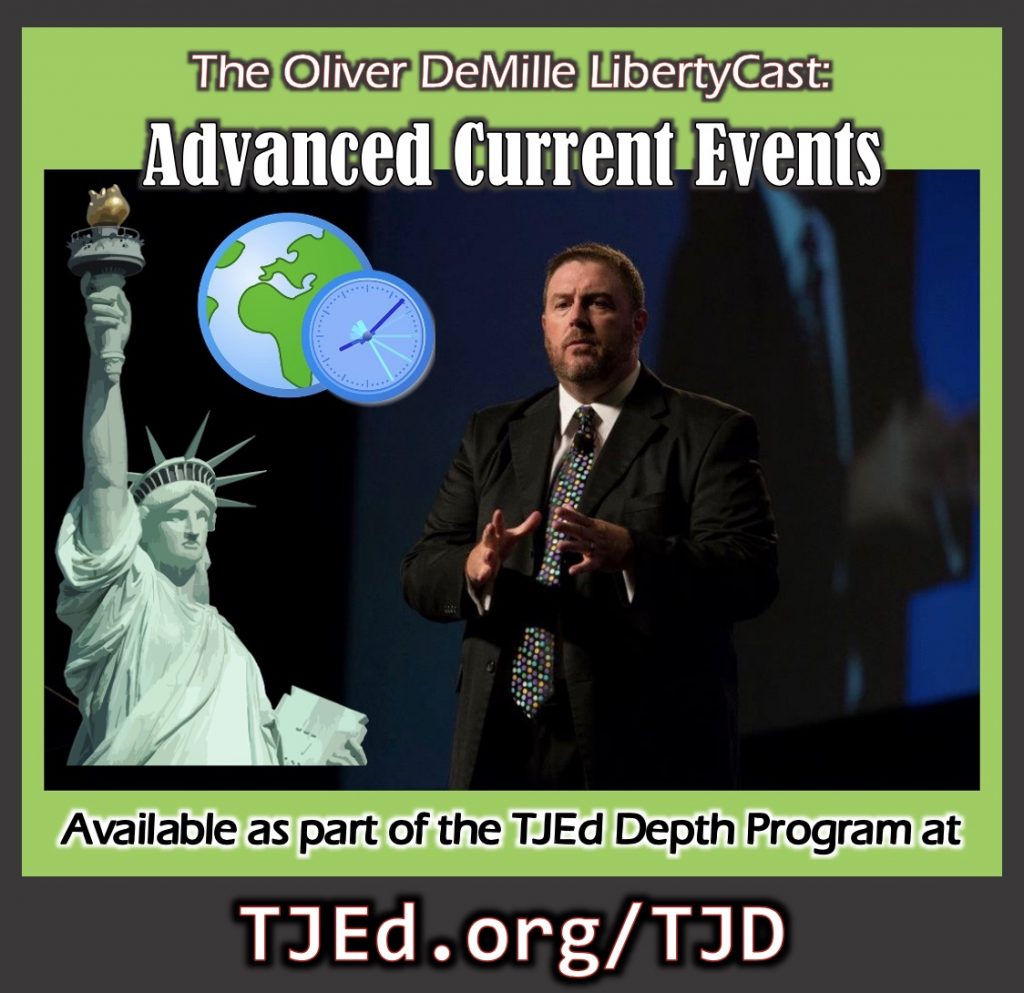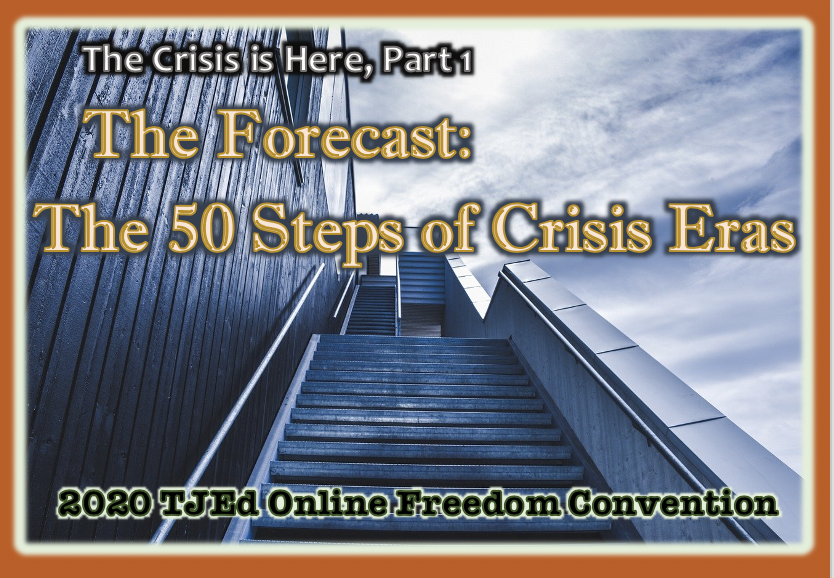What Every Parent (and Citizen and Leader) Should Know Right Now About College
August 1st, 2025 // 9:16 am @ Oliver DeMille
 I’ll be brief. College is changing rapidly, and parents, leaders and anyone who cares about education, freedom and our society needs to know about and understand these changes. Specifically, they need to know about 7 significant changes that are happening right now in the college-university-credential-career system. These are dramatically impacting our nation. Yet for some reason these changes are not effectively making it into the hands of all, or even most, parents, students and others who care about our society.
I’ll be brief. College is changing rapidly, and parents, leaders and anyone who cares about education, freedom and our society needs to know about and understand these changes. Specifically, they need to know about 7 significant changes that are happening right now in the college-university-credential-career system. These are dramatically impacting our nation. Yet for some reason these changes are not effectively making it into the hands of all, or even most, parents, students and others who care about our society.
Let’s change that, right here. The purpose of this post isn’t to promote college, or to discourage it. For some young adults, college is the perfect thing, and others may thrive more in an alternative to college. But without a knowledge of these changes, nobody is fully informed and therefore it can be much more difficult to make the best decisions for each individual student—or for citizens to understand how these changes are impacting our national future.
1. Changing Views on College
 A lot of people, including many higher education experts, are questioning if college is worth the cost anymore. According to Gallup, high confidence in college and universities is down to just 36 percent, after being much higher for the last five decades. (“American’s Confidence in Higher Education Remains at All-Time Low” The Epoch Times, Pan)
A lot of people, including many higher education experts, are questioning if college is worth the cost anymore. According to Gallup, high confidence in college and universities is down to just 36 percent, after being much higher for the last five decades. (“American’s Confidence in Higher Education Remains at All-Time Low” The Epoch Times, Pan)
For those planning on careers in licensed fields such as medicine, law, public-school teaching, etc., college is necessary. For many careers it is not. The key is to research the options and personalize for your
2. Rising Costs and The Six-Year Degree
The price tag of a college education has skyrocketed. The annual cost of tuition has increased more than 179 percent in the last 20 years (“How are college costs adding up these days and how much has tuition risen?” USA Today, Chernikoff; “Buyer Beware: Fees Skyrocket Costs of Higher Education” Forbes, Ladany), and the cost of housing and other living expenses went up almost twice as fast as tuition rose during this time.
The average annual cost of attending an in-state 4-year public college increased from $3,500 per year in 2001 to $9,750 in 2022 (Education Data Initiative, EducationData.org, Hanson). This does not include the higher room and board prices (now averaging $12,917 a year), higher costs for books and supplies (now $1,220 per year), and almost $4,100 per year in additional expenses for students not living at home. (Ibid.)
 In addition to these increases, the average time to graduate with an undergraduate degree is now 6 years, not the traditional 4 years of decades ago. (National Center for Education Statistics) With all these expenses added together, the average total cost for a person to get a public undergraduate degree is estimated at between $168,000 and quite a bit higher.
In addition to these increases, the average time to graduate with an undergraduate degree is now 6 years, not the traditional 4 years of decades ago. (National Center for Education Statistics) With all these expenses added together, the average total cost for a person to get a public undergraduate degree is estimated at between $168,000 and quite a bit higher.
In comparison, though there are differing statistics on this, the approximate total cost for an undergraduate degree twenty years ago was around $58,000. Note that these numbers are for public institutions; most traditional private schools cost a lot more. None of these numbers include the cost of interest on student loans. The numbers of young college graduates filing for bankruptcy recently hit the all-time high. (“Is College Education No Longer Worth It?” The Epoch Times, Ford)
College can be a long-term boost to the finances of graduates; but this is not guaranteed, though many people assume it is. Financial returns over a lifetime based on college degrees depend a great deal on the student’s college major and first job after graduation. Over 52 percent of recent college graduates are underemployed, meaning they work in a job that doesn’t require a college degree. (“Most college graduates face underemployment upon bachelor’s attainment,” The Thomas B. Fordham Institute, Murray) Just over a quarter of graduates in some majors end up working in their field. In the STEMM (Science, Technology, Engineering, Mathematics, and Medicine) majors and other licensed fields this number is typically much higher. The 6 year average time to get an undergraduate degree is a major change from the 4 year model of past decades.
3. The Real Numbers and the Skilled Careers
 Many parents and grandparents are wondering: What is college even like now, compared to when they attended? The old myths about college graduates receiving a million dollars more in lifetime earnings than non-college peers have been debunked, because too many factors weren’t included in that statistic, like the added costs of student loans and interest, the 4-7 fewer years those with degrees spend out of the work force, the extra savings and investing the non-college person makes for 4-7 extra years, the significant differences in lifetime earnings between different academic majors—and between males and females, and other demographic groups—etc.
Many parents and grandparents are wondering: What is college even like now, compared to when they attended? The old myths about college graduates receiving a million dollars more in lifetime earnings than non-college peers have been debunked, because too many factors weren’t included in that statistic, like the added costs of student loans and interest, the 4-7 fewer years those with degrees spend out of the work force, the extra savings and investing the non-college person makes for 4-7 extra years, the significant differences in lifetime earnings between different academic majors—and between males and females, and other demographic groups—etc.
In certain majors, college graduates still make a lot more than non-credentialed workers, but in many majors they don’t. And demographic trends are greatly increasing the demand for many non-college skilled trades and careers (e.g. construction managers, electricians, plumbers, business owners, dental hygienists, various types of therapists, technicians, and high-tech roles, etc.), a number of which are increasingly more lucrative than college degrees in many majors.
For example, consider the “Doctor vs. Plumber Debates” about which career path is wealthier at age 42. There are lots of articles and videos on this. Surprising and interesting. A little folksy at times, but important information.
4. Fewer Students and Cutting Programs
Because of population trends, starting in the fall semester of 2025 and for many years ahead the number of college-age students will be significantly smaller than it has been up to now (“A looming ‘demographic cliff’: Fewer college students and ultimately fewer graduates” NPR, Marcus), meaning major economic downturns in higher education. Decreasing enrollments have led hundreds of campuses to close recently, and this trend is accelerating.
 With the added reality of a lot more college-age students opting for non-college alternatives, even most large prestigious schools are cutting faculty, staff, majors and various programs—or planning to make significant cuts in the years ahead.
With the added reality of a lot more college-age students opting for non-college alternatives, even most large prestigious schools are cutting faculty, staff, majors and various programs—or planning to make significant cuts in the years ahead.
Parents and students must do their research before enrolling to make sure the programs you’re seeking will still be there in 5-7 years when most of this year’s new freshman will graduate and the number of students in college will be significantly decreased.
5. A Lot More Alternatives
There are numerous popular and increasingly accepted alternatives to on-campus college education, including multiple new forms and styles of learning, job and career training.
 For example:
For example:
- gap year projects
- apprenticeships
- internships
- certifications from high-tech online training programs—many of them 1 year to 18 months in duration rather than 4-7 years
- online certificate programs
- bootcamp learning
- community colleges
- tech schools
- online college course options like those offered by Coursera, EdX, Udemy, Khan Academy, Udacity and many others
- great college-level programs that emphasize learning and ignore credits and grades—like non-credit classes from Harvard, Yale, MIT, Standford, Hillsdale, and hundreds of other colleges and universities
- high-quality educational organizations that aren’t colleges or universities such as The Great Courses, MasterClass, TedX, SkillShare, HubSpot Academy
And of course, my favorite: TJEd Depth.
Also, the movement by certain billionaires and other educational leaders to help some of the best and brightest young adults skip college and build a business, partner on an entrepreneurial venture, or join a start-up team. Simultaneously, the alternative credentials (not degrees) sector is growing rapidly, and alternative non-college credentials are now accepted by many big organizations, including IBM, Google, Bank of America, Apple, Amazon, the U.S. Federal Government, a growing number of U.S. state governments, and many more. (“How Alternative Credentials are Shaping Modern Education,” Higher Education Today; “Organizations that Accept Alternative Credentials in Hiring,” Google AI Overview; “The Rise of Alternative Credentials in Hiring,” SHRM.org)
Many experts and organizations now promote new “post-industrial-age” credentialing systems not based on degrees but rather on proven competencies, knowledge, experience and skills. This trend is increasingly known as the “skills first” model.
6. Woke-ism and the Shadow Curriculum
 Left-leaning political activism on most campuses is real and deeply concerning. The number of young adults from homes with traditional family values, pro-faith beliefs, and/or conservative views who are now adopting leftist, anti-family, anti-morality and/or anti-faith perspectives and even aggressively going “woke” during their college years is alarming.
Left-leaning political activism on most campuses is real and deeply concerning. The number of young adults from homes with traditional family values, pro-faith beliefs, and/or conservative views who are now adopting leftist, anti-family, anti-morality and/or anti-faith perspectives and even aggressively going “woke” during their college years is alarming.
A number of experts are concerned that a major focus of many colleges and universities in recent years seems to have shifted to things happening outside the classroom: protests, political arguments, shouting down visiting speakers (on campus but also in classes), mass walk-outs from classes and assemblies, protestors physically stopping students from going to classes, assaults based on political or religious views, etc.
It is important to look into the schools you’re considering and find out what kinds of things go on there.
7. Direct Admission Options
Because of demographic trends and declining enrollments, a number of colleges and universities have adopted or ramped up direct admission policies. (“Even if They Didn’t Apply, Some Students Get College Admission Offers” The New York Times, Carrns)
 Direct Admission means that a school accepts any student who meets certain criteria, such as a qualifying SAT or ACT score or a certain GPA, or other criteria—depending on the school. Qualifying students are guaranteed admission, and simply need to sign up, provide information the school can verify, and enroll.
Direct Admission means that a school accepts any student who meets certain criteria, such as a qualifying SAT or ACT score or a certain GPA, or other criteria—depending on the school. Qualifying students are guaranteed admission, and simply need to sign up, provide information the school can verify, and enroll.
This is streamlining the process for many students, and significantly decreasing the time and effort of getting into certain schools. It also cuts costs for the institution.
Over a hundred schools now offer direct admissions, including many state-run schools in over a dozen states (including Illinois, California, Texas, Minnesota, Idaho, Indiana, Washington, Hawaii, Utah, North Dakota, Wisconsin, Connecticut, Oregon and New York.) (“More state colleges are admitting students—before they apply” The Washington Post, Humphreys and Rizzolo) The number of direct admission schools is rapidly increasing.
One other thing that’s been around a long time, but is now increasingly prevalent, is online classes for credit that allow students to do much of their classwork from home or remote locations. In many schools these classes supplement in-class work, and in a growing number of schools the online coursework is the bulk of learning and in-class studies supplement the laptop or tablet learning.
In short: we’re living in an era of educational renaissance.
But all this change and these many new offerings have understandably sparked a lot of confusion about which of these alternatives work and which don’t. And which is best for a specific 18- to 24-year-old. Or older. Part of the challenge is that we don’t yet know which options will last and which will fade over time. And parents and students still must decide whether their main educational goals emphasize great learning or specific job credentialing.
 One more thought, which shocked me when I read about it in the excellent book, The Great Upheaval. Traditional on campus students aged 18-22 now account for less than 20 percent of college students. This number doesn’t even include students in the many non-college alternatives out there—it’s just about college students.
One more thought, which shocked me when I read about it in the excellent book, The Great Upheaval. Traditional on campus students aged 18-22 now account for less than 20 percent of college students. This number doesn’t even include students in the many non-college alternatives out there—it’s just about college students.
Another way to see this: More than 80 percent of actual college students are now non-traditional students, such as those in their 30s or older and those in distance studies on laptops at home or elsewhere rather than sitting in classrooms. Over 80 percent! Lots of changes. So many options. And more coming.
After all this, I’m left with two big questions:
1. What do we really want to happen with our current college/credentials/career system?
 The old system is struggling, mainly because industrial-age institutions are finding it very difficult to transition to the quantum age. But the old system also has some excellent features that have lasted for many decades. (I would say “centuries”, but the college system before 1944 was totally different than the system after 1944.) Most importantly, in terms of where we’re headed, a growing number of employers don’t trust the old 1944-2024 system. They want something new, something that fits today’s economy and needs. In other words, we’re going to get something new.
The old system is struggling, mainly because industrial-age institutions are finding it very difficult to transition to the quantum age. But the old system also has some excellent features that have lasted for many decades. (I would say “centuries”, but the college system before 1944 was totally different than the system after 1944.) Most importantly, in terms of where we’re headed, a growing number of employers don’t trust the old 1944-2024 system. They want something new, something that fits today’s economy and needs. In other words, we’re going to get something new.
Still, a lot of people don’t yet see the alternative credentials or learning systems as realistic replacements for the old college model. At the same time, student debt and young college graduate bankruptcies keep climbing; degrees in many majors simply aren’t delivering the “promised” financial returns. What is the best approach—for our children, the employers and the economy, the future of education and jobs, and the world?
- A: Would a return to the old-style system of colleges in the 1980s and 1990s—without all the confusing alternatives—be the best solution? One system, one standard of credentials?
- B: Would it be better to keep the old college-on-campus model for whoever wants it and simultaneously encourage new alternatives far and wide?
- C: Or would our best approach as a nation be to just dump the old and move on to the new—since it’s coming anyway, inevitably?
Your thoughts on this?
2. How bad would a major shift from the old college model to a new skills-based (non-degree-based) system hurt our nation?
 In my view, it might really help. For the past eight decades our colleges and universities have become less and less institutions of higher learning and more and more career training programs.
In my view, it might really help. For the past eight decades our colleges and universities have become less and less institutions of higher learning and more and more career training programs.
This system has done a lot of good for many people, of course, but it also lost some essential things along the way, like actual higher education—history, leadership skills, classics, the great books, principles of freedom, the liberal arts and sciences, etc.—which have been increasingly sidelined or in many schools entirely shelved.
We desperately need a reboot of these topics and skills in our society. The future of freedom, leadership, free enterprise and widespread prosperity depend on it.
But it shouldn’t be limited only to those who can afford for their youth to be on campus for 6 years. We need all youth to learn these things.
This is the big question: How can we re-implement actual higher education again?
What do you think?
~od
(NOTE: A sequel, or Part II of this article—with additional, different trends in college—is found in the Audio Presentation: “NEW 2025 UPDATE: MAJOR CHANGES IN COLLEGES & UNIVERSITIES”, which is part of the 2025 TJEd Education Convention. This article discusses key points that are NOT covered in the Audio Presentation—and vice versa.)
Want to go deeper?
- Audio presentation: “NEW 2025 UPDATE: MAJOR CHANGES IN COLLEGES & UNIVERSITIES” 2025 TJEd Education Convention, DeMille
- The Great Upheaval, Levine and Van Pelt, Johns Hopkins University Press
- Hacking College, Laff and Carlson, Johns Hopkins University Press
- Freedom Matters, DeMille, Obstaclés Press
- Paradigm Shift, Guzzardo, Obstaclés Press
- Who Needs College Anymore?, Delaski, Harvard Education Press
This post contains affiliate links. Thank you so much for your support!
Category : Blog &Business &Culture &Current Events &Economics &Education &Entrepreneurship &Featured &Generations &History &Information Age &Leadership &Liberty &Postmodernism &Producers &Statesmanship
The 5 Best Books I Read in 2024 By Oliver DeMille
December 19th, 2024 // 5:06 am @ Oliver DeMille
They are all worth reading. In fact, it was very difficult to narrow it down to just 5. With that said, here they are, along with some thoughts on why each one is great, and tips on things to look for as you go. If any of them pique your interest, get them and read… Enjoy the list!
- Insidious by Orrin Woodward. This book is fantastic! A must read, and a runaway for the #1 top book of the year. In fact, it’s so great that I wrote an entire article and review just to talk about the super-important ideas in this one book.
| Tip: Go read my article about this book here. |
- Government Gangsters by Kash Patel. It’s deep, spot on, and incredibly relevant to our world today. Patel outlines what needs to happen to get our government back, specifically to size it down wisely and make it follow the Constitution once again. And he tells us what to do as well as the specifics of how to do it. Great book! Fabulous read, whether you agree with his recommendations or not.
| Tip: Pay special attention to everything he says about “fencing”. This alone is worth the price of the book. And after you study this, also research the word “impoundment” as it relates to the Federal Government. So important. Indeed, Fencing and Impoundment may be as important in our time as Checks and Balances were in the time of the American Framers. Not that they should be, but you want to know what they are and how they are used. |
- Jane Austen’s Little Book of Wisdom compiled by Andrea Kirk Assaf. This small book is pure fun! Every quote is worth deeply pondering. You’ll truly benefit from the witty and profound wisdom it contains. I loved it. Whether you want to be a better leader, spouse, dad, mom, student, sibling, boss, or employee, or just improve yourself and your effectiveness in relationships and life, this book is great reading on two levels—the wisdom of the words, and the beauty of how Austen uses the language. It will put a little more poetry and charm into your personality! Or just bring more smiles to your face in the year ahead. Super fun.
| Tip: Read and ponder one quote each day. At this pace it will last almost a year—and the year will undoubtedly be better! |
Continue Reading >>
Category : Blog &Book Reviews &Citizenship &Community &Culture &Current Events &Economics &Education &Featured &Generations &Government &History &Independents &Information Age &Leadership &Liberty &Politics &Postmodernism &Producers &Prosperity &Statesmanship &Technology
The Best Books of 2022
January 2nd, 2023 // 5:16 am @ Sara DeMille
JUST IN TIME TO READ THEM IN 2023!
An Invitation
 Great reads are, well…great. They move you. Or change you. Or invite you to face challenging realities, or approach the future in better, more effective ways. They empower you, or help you do other equally important things.
Great reads are, well…great. They move you. Or change you. Or invite you to face challenging realities, or approach the future in better, more effective ways. They empower you, or help you do other equally important things.
A great read is a life-changing event. As Thomas Jefferson wrote to John Adams in the summer of 1815:
“I cannot live without books.”
And to Abigail Adams he penned the famous words:
“…my greatest of all amusements, reading.”
To James Madison he added a longer view:
“Books constitute capital. A library book lasts as long as a house, for hundreds of years. It is not then an article of mere consumption but fairly of capital.”
To founding leader Richard Rush he put it bluntly:
“Books are indeed with me a necessary of life.”
Ironically, to write out everything Thomas Jefferson wrote down about books and reading would require a very long book.
In trying to emulate his passion for books, along with the pondering and deep consideration that naturally occurs when you read almost constantly, I habitually take a few moments at the end of each year and look over the list of the books I’ve read in the last 12 months. And, invariably I find myself listing and ranking the best ones—and debating which is the #1 vs. #2 vs. #3 TOP book of the year. I seldom do this with fiction books, though I read a lot of them. In fact, Jefferson did too. He wrote:
“Some of the most agreeable moments of my life have been spent in reading works of imagination [fiction, literature] which have this advantage over history [non-fiction]: that the incidents of the former may be dressed in the most interesting form, while those of the latter must be confined to fact. They cannot therefore present virtue in the best [or] vice in the worst forms possible, as the former may.”
The List
So, every year I write a list of the top non-fiction books I’ve read. This year was no different. Here are my Top 7 Non-Fiction Reads of 2022, in order, starting with the best, TOP BOOK #1 and down the list. Most lists like this ramp up to the very best book and present it last, but I tried that and just didn’t like it.
I’m shooting straight here, top 7 best books in order:
- The Psychology of Totalitarianism, by Mattias Desmet. This book tackles the biggest challenge we face in our modern world right now. It’s a must read for anyone who cares about freedom. And the challenges it outlines are mostly still ahead—so read up! It’s vital prep for what’s coming… I’ll be addressing it in several classes and events coming in 2023! And so will Ian. So excited…
- The 90-Degree Turn, by JB Fred Eberlain. This is a great, great read—I wish every American would read this and think about it seriously. It addresses what I think is the second biggest challenge faced by America and other free nations right now. Also, when you get to the section on Solutions in this book, compare his proposals to those outlined by Orrin Woodward and myself in our book LeaderShift—together the combined list of solutions is really powerful.
- The Right and Wrong of Compulsion by the State, by Auberon Herbert. All right, I’ll admit that this book has a boring-sounding title, except maybe to history/political nerds like me. And the author’s name, Auberon, doesn’t help—especially with the surname “Herbert” attached. It just feels stuffy all around. But look past that! Because this is one of the best books you’ll ever read in your life. It’s very short, only about 30 pages (or a few more if you find it in small booklet form). And this is the best book on the basic meaning of freedom you’ll ever see. It’s better than The Law by Bastiat, and anyone who cares about freedom simply must read this book. It’s brilliant.
- Discourses on Davila, by John Adams. Maybe the best book I read during 2022, even though I’ve read it a dozen or more times before. It’s a life-changer, if you take the time to really learn from it. It may be the most important book you read this decade, and the best book out there about our times, our era in history—even though John Adams wrote it over two hundred years ago. (By the way, you can get it for $30-$50 as a separate title, or you can save money and buy it for around $12 as part of The Works of John Adams, Volume 6, easy to find on Amazon.)
- The Righteous Mind, by Jonathan Haidt. This book was written in 2013, but I didn’t read it until 2022 when my son Oliver found it and sent me a passionate recommendation. It’s deep, and incredibly timely. Fabulous read. It will forever change the way you see modern politics. It brings a whole new understanding of things, like the first time you read The Fourth Turning by Strauss & Howe.
- 100 Games to Play with a Stick, by author unknown, published by DSS Games. I wish I would have known about this book during the Covid-19 lockdowns, because I would have recommended it to everyone I know. But it’s not too late. It’s fun, it’s funny, and on top of that, it’s hilarious. It’s a book for our time, in a profound way. You have to read it, and really think about it, to get how important it is. Truth: It heals what ails you…
- Resilient, by John Eldredge. This book takes a decidedly Christian and religious tone, which you may or may not like, but it’s a great read regardless of your religious/political views. What a poignant message. The author assumes that everyone right now is experiencing some real post-Covid-PTSD-type symptoms, and the book is meant to heal. It’s extremely effective; even where I disagreed with some things in the book, I still found myself feeling warm, healing, relaxed. Stress I didn’t even realize I was carrying just melted away as I read. It works. Read it, and share it. We need it.
Great News
Concerning the topic of books as the best media, Jefferson wrote in a letter to John Norville in 1807:
“…the man who never looks into a newspaper is better informed than he who reads them; inasmuch as he who knows nothing is nearer to truth than he whose mind is filled with falsehoods & errors.”
With modern media the way it is, I just couldn’t resist including this quote. And here’s how Jefferson put it elsewhere, with less sarcasm, pointing out the importance of books:
“I have given up newspapers in exchange for Tacitus and Thucydides…and I find myself much the happier.”
He considered great books better media than other kinds of news, and he also considered great books a better source of education than formal lectures and other systems of schooling that don’t center around the best books. His wisdom is still relevant today, perhaps more than ever.
Note, by the way, that the main theme of Tacitus was the loss of political freedoms and personal liberty that led to the decline and fall of the Roman Republic and the takeover of the Empire, and how it all happened; Thucydides’ main contribution was a study of how Athens lost its freedoms and went from the Greek Golden Age standing as a beacon of freedom to a fallen people enslaved by the Spartan Empire and its totalitarian socialist government.
Bread and Circuses
Both peoples, the Greeks and later the Romans, lost their freedoms and prosperity in a very short period of time, and hardly any of them realized what was happening, or how it was occurring, until it was too late. Jefferson hoped Americans would learn from this and not repeat it, starting by turning to the great books for news and education, rather than the bureaucratic media and bureaucratic schools of the day.
Talk about real news. Actual wisdom. If only such books were still available to us today. But with so many shows and movies to watch on streaming platforms, not to mention so many loud and angry news shows each evening, who has the time? As for education, such books get in the way of this week’s career-prep/college-major assignments and so many interesting posts on the smartphone. Oh well… Freedom will have to wait. It’s a generational disease: generations born to freedom and prosperity are notoriously distracted by career (bread) and entertainment (circuses). In fact, they’re more than distracted—they’re convinced they are entitled to these things, and they expect them to be provided easily and without sacrifice or effort. Writers like Tacitus and Thucydides address this situation, its results, and what to do, but…
Who reads that stuff?
As for the seven Top Books of the Year listed above, agree or disagree with some of the details in each, but they are all worth reading! I wouldn’t skip any of them. They are Tacitus and Thucydides for our time, especially #s 1-4.
Enjoy…
Want more up-to-the-minute commentary by Oliver DeMille?
Join TJEd Depth for your continuing education, and get access to the Oliver DeMille LibertyCast on Advanced Current Events and even get day-in-day-out access to mentoring and discussion on a live discussion forum with Oliver and a select few participants!
Visit TJEd.org/TJD for more details >>
Category : Blog &Book Reviews &Citizenship &Culture &Current Events &Education &Featured &Government &History &Information Age &Leadership &Liberty &Politics &Statesmanship
The 2020 TJEd Online Convention is getting Rave Reviews!
April 6th, 2020 // 1:13 pm @ Oliver DeMille

Here’s what people are saying!
Many thanks to your whole family for all you do!
~ Jennifer Halverson
Watch the video trailer!
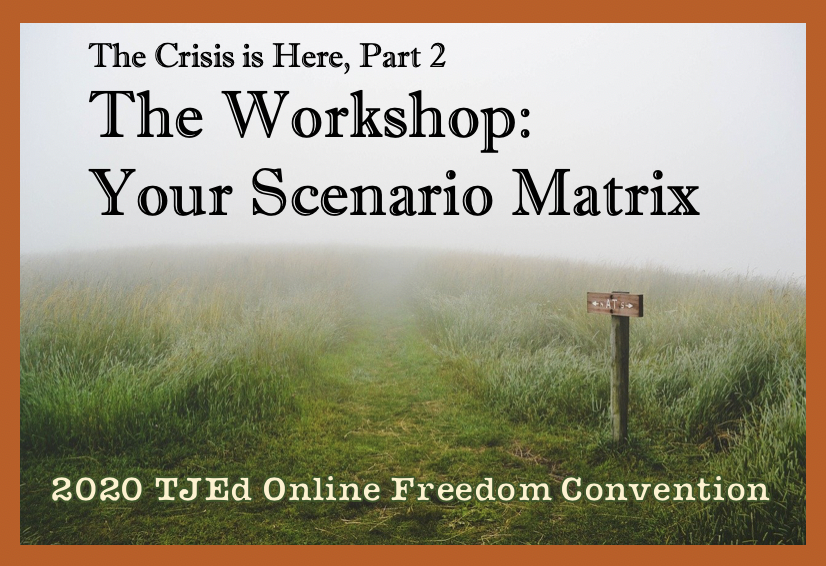 Listened to these talks in the convention today…I am speechless! I had chills the whole time I was listening! I’m excited to go back and do the planning section. Amazing how my perspective has changed so quickly. Going to have my husband listen, too. Thank you so much for this amazing resource!!!
Listened to these talks in the convention today…I am speechless! I had chills the whole time I was listening! I’m excited to go back and do the planning section. Amazing how my perspective has changed so quickly. Going to have my husband listen, too. Thank you so much for this amazing resource!!!
UPDATE: I just now worked through part of the matrix exercise. Wow, how powerful!
~ Rachael Breneman
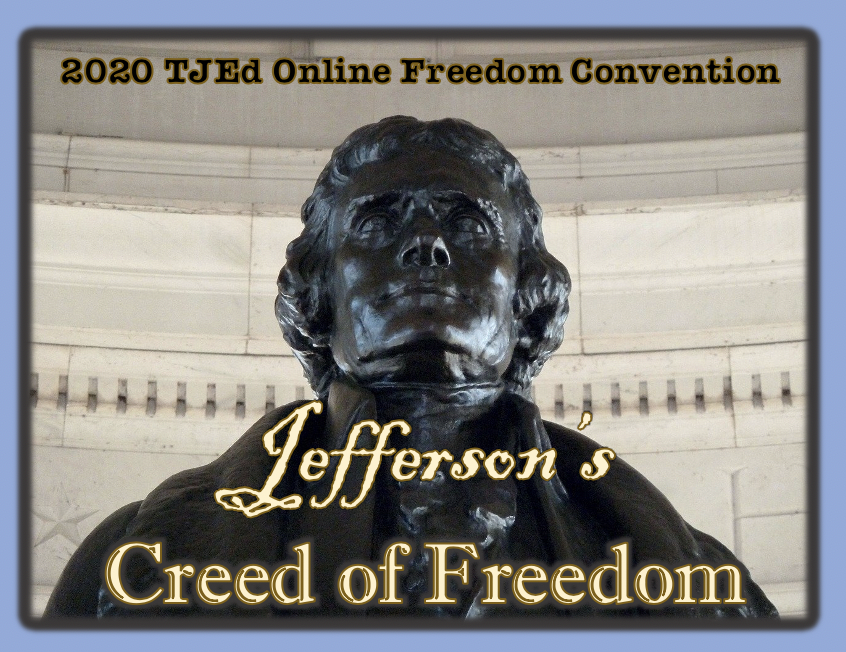 I just want to say thank you to you both. You have sacrificed so much for your mission and so many of us and our children have been blessed because of your sacrifice! I listened to The Crisis is Here part 2 from the 2020 Freedom convention today. On top of the wonderful exercise Oliver led and the incredible insight, I was also struck with how grateful I am that I have been so prepared for this moment.
I just want to say thank you to you both. You have sacrificed so much for your mission and so many of us and our children have been blessed because of your sacrifice! I listened to The Crisis is Here part 2 from the 2020 Freedom convention today. On top of the wonderful exercise Oliver led and the incredible insight, I was also struck with how grateful I am that I have been so prepared for this moment.
It is thanks in a large part to being mentored through TJEd that I have the family culture, understanding of turnings and history, life centered at home, classics on our shelves that teach us human nature, an appreciation for seasons and cycles and the confidence and ability to teach my family. While these times are uncertain, I don’t feel afraid or overly anxious. I’m actually looking forward to the next few decades and what “spring” will bring. I’m excited for my children and I to be a part of it!
~ Amy Updike
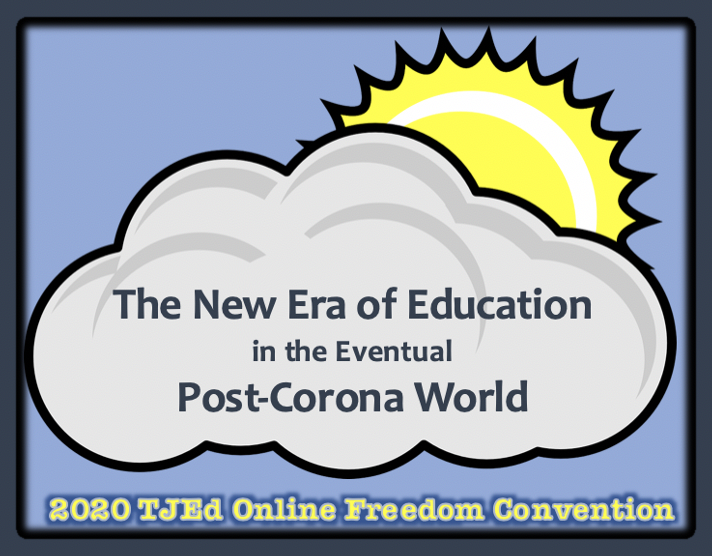 Before any of us realized what happened, the world changed, and it is very likely that for better or worse, nothing will be the same again.
Before any of us realized what happened, the world changed, and it is very likely that for better or worse, nothing will be the same again.
Now what?
I have learned a great deal from Oliver DeMille. The talks he has given already in this convention have really changed the way I am looking at what is happening right now, and he is just getting started.
If you want to know what to do to adapt to our new reality, I’d recommend signing up for this convention!
~ Colby Lyons
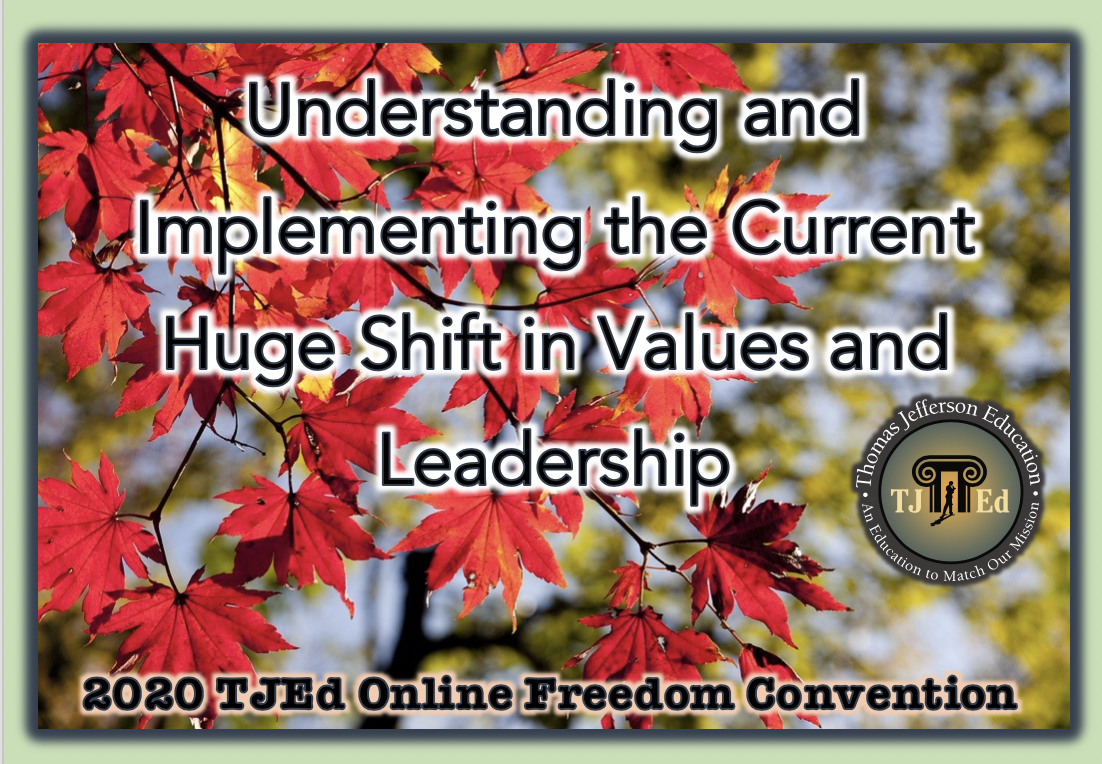 Oliver and Rachel, THANK YOU so much for this year’s convention! We just listened to the 2nd workshop and are so excited for this time in history!
Oliver and Rachel, THANK YOU so much for this year’s convention! We just listened to the 2nd workshop and are so excited for this time in history!
We’ve handled the crisis well because of our faith but this really got us pumped for our future!
My daughter, who is a senior, has struggled a little because she felt so uncertain of her immediate future.
Now, she’s happy and at peace that she is already on the right path to get through this crisis well. She loved the workshops so far! Can’t wait for the rest!
~ Kellee Clark
Watch the video trailer!
Join us for the 2020 Freedom Convention Here!
Special thanks to Lyle Mast of OR Sports for his contribution of 100 family scholarships!
And TJEd is matching that sponsorship to cover an additional 100 families!
If you need this assistance in order to participate in the convention, PLEASE don’t hesitate to request it; that’s exactly what it’s for, and we don’t want you to miss out!
Just click here to inquire and we’ll get you taken care of.
Category : Aristocracy &Blog &Business &Citizenship &Constitution &Culture &Current Events &Economics &Education &Entrepreneurship &event &Family &Featured &Generations &Government &History &Independents &Information Age &Leadership &Liberty &Mini-Factories &Mission &Politics &Producers &Prosperity &Statesmanship &Tribes
NEWS OF THE DAY by Oliver DeMille: Lessons from Crisis
April 6th, 2020 // 5:19 am @ Oliver DeMille
Lessons from Crisis
 The popular saying that “we shouldn’t let a good crisis go to waste” applies to the regular people and citizens, not just to politicians. In fact, politicians often use such thinking to make things worse.
The popular saying that “we shouldn’t let a good crisis go to waste” applies to the regular people and citizens, not just to politicians. In fact, politicians often use such thinking to make things worse.
But the regular people can do a lot of good during times of crises. In fact, they usually do.
Right now is no exception. There are a lot more people helping and serving others during this crisis than the media ever mentions. That’s a testament to good people. In addition, many people are doing another very interesting thing during this crisis, one that may last and impact our society for good long after the crisis passes. Specifically, people are realizing that the large majority of the news media isn’t handling crises very well–going as far as frequently omitting truth in reporting, and at times skewing or spinning the truth instead of just sharing the facts and trusting listeners to use their own brains.
The media has done this for a long time, but during crisis a lot more people are catching on–realizing that the media is frequently less than direct and truthful. It can be a benefit for our society, if people realize the media isn’t as truthful as the majority once believed. Gallup conducted a national U.S. poll in the last week of March 2020, and they asked people around the nation the following question:
“Do you approve or disapprove of the way each of the following is handling the response to the coronavirus in the U.S.?”
Americans ranked the media dead last of all the institutions listed. The approval rating for the news media was only 44 percent, while 55 percent disapproved. Compare this to 88 percent approval for hospitals, 83 percent for schools and daycare, 82 percent for “your state” and the same for “your employer”. Even political officials received higher-than-usual marks, with president Trump at 60 percent approval and Congress at 59 percent. The news media was the only institution that Americans rated underwater–with many more disapproving than approving.
Hopefully the crisis can have at least two silver linings concerning the future of media:
1) the media will get its act together and stop substituting agenda-driven spin for real journalism, and
2) the American people will remember to treat media reports with skepticism–and do their own research on the news that is important to them.
I’m not holding my breath for #1, but I think the crisis will likely convince a lot more people to wisely apply #2. Lessons learned in crisis can help us do better in the future.
Category : Blog &Business &Citizenship &Community &Culture &Current Events &Economics &Featured &Generations &Government &History &Independents &Information Age &Leadership &Politics &Service &Statesmanship &Technology


